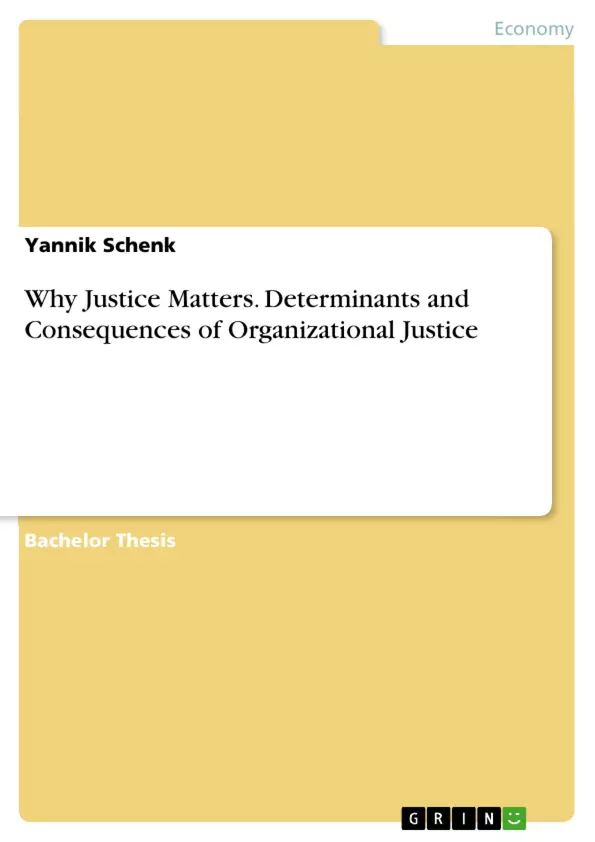Organizational justice research identified a broad set of possible emotional, attitudinal and behavioral consequences to justice perceptions. Empirical evidence of these relationships strongly emphasizes the importance of justice concerns for organizations. Mainly discussed are behavioral reactions to justice, categorized in organizational citizenship behavior, task performance and counterproductive work behavior. Several theoretical approaches offer deeper understanding into why these consequences may occur, and facilitate accurate predictions. In order to clarify what individuals perceive as just in organizations, scholars identified different dimensions of justice. Taken together, the field of organizational justice research offers valuable insights for practical application. These conceptualizations of consequences, underlying processes and the sources of justice perceptions can serve as a practical valuable guideline for organizations. Thus, it helps companies to identify reasons for beneficial and harming employee behavior and points out ways to foster employee’s organizational support.
Inhaltsverzeichnis (Table of Contents)
- The motives of justice and injustice fascinated people through all ages.
- In times of intercontinental competition and ever-advancing optimization of effective processes, managers seek for new possibilities to enhance sustainability and efficiency of their organizations.
- The field of Organizational Justice has grown exponentially through recent years.
- The objective of this thesis is to offer an access to the practical value of organizational justice research, introducing the most established acknowledgements of research.
- The Sources of Justice Perceptions
Zielsetzung und Themenschwerpunkte (Objectives and Key Themes)
This bachelor thesis explores the significance of organizational justice within organizational behavior. It aims to clarify the main factors that contribute to perceptions of fairness and how these perceptions affect employee attitudes and behaviors.
- Understanding the different dimensions of justice (distributive, procedural, interactional)
- Investigating the theoretical models explaining the impact of justice perceptions on employee reactions
- Analyzing the behavioral consequences of justice perceptions, including organizational citizenship behavior, task performance, and counterproductive work behavior
- Highlighting the practical implications of justice research for organizations to foster employee engagement and performance
Zusammenfassung der Kapitel (Chapter Summaries)
- This chapter examines the historical and philosophical foundation of justice, highlighting the importance of fair treatment in human interactions. The chapter also introduces the concept of perceived justice and the subjective nature of fairness judgments.
- This chapter emphasizes the importance of justice in the modern workplace and the interconnectedness of justice perceptions with employee attitudes and behavior. It discusses how organizations are susceptible to justice concerns due to their inherent structure of interdependent actions.
- This chapter provides an overview of the growing field of organizational justice research. It highlights the significance of justice perceptions in predicting and influencing organizational behavior. The chapter reviews key studies that have established the connection between justice concerns and various organizational outcomes.
- This chapter focuses on the main dimensions of justice: distributive, procedural, and interactional justice. It discusses how these dimensions contribute to individuals' perceptions of fairness in organizations. The chapter also explores the different conceptualizations of justice and their implications for research and practice.
Schlüsselwörter (Keywords)
This thesis focuses on the field of organizational justice, exploring its key dimensions, underlying theories, and practical implications. It emphasizes the importance of understanding the sources of justice perceptions, the impact of justice on employee reactions, and the behavioral consequences of fairness judgments.
Frequently Asked Questions
What is Organizational Justice?
Organizational Justice refers to employees' perceptions of fairness in the workplace, including how rewards are distributed and how decisions are made.
What are the three main dimensions of justice?
The dimensions are distributive justice (fairness of outcomes), procedural justice (fairness of processes), and interactional justice (fairness of interpersonal treatment).
How does perceived injustice affect employee behavior?
Injustice can lead to counterproductive work behavior (CWB), decreased task performance, and lower organizational citizenship behavior (OCB).
What is Organizational Citizenship Behavior (OCB)?
OCB refers to voluntary actions by employees that go beyond their formal job descriptions and contribute to the overall effectiveness of the organization.
Why should managers care about justice perceptions?
Fostering a sense of fairness increases employee engagement, support for the organization, and overall efficiency, reducing the risk of harmful behaviors.
- Arbeit zitieren
- Yannik Schenk (Autor:in), 2014, Why Justice Matters. Determinants and Consequences of Organizational Justice, München, GRIN Verlag, https://www.grin.com/document/283767



